When we start out blogging, we tend to have all these wild ideas about how book blogging actually works. More than that, we have so many hopes, a Iot of which seem to be ungrounded. So I’ve decided to write a post about book blogging myths we often start out with. Maybe it could prevent some confusion and disappointment in newbies? I’m certainly not saying you should skip having hopes and desires – but I think it’s a better thing to start doing anything if you have a clearer picture of what’s the general experience and how you can manage your expectations. I would have certainly been less burned out and disappointed, had I realized some of these things when I first started blogging!
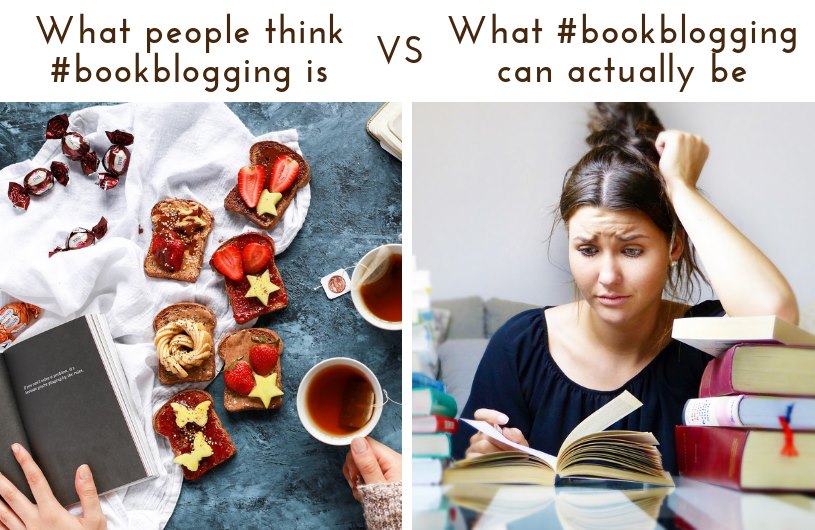
An image comparing two situations: “what people think book blogging is” which has a pleasing image of tasty food, tea, and a book in someone’s hands, versus a situation that’s labelled “what book blogging can actually be”, depicting a woman with a confused and worried face, reading a book with multiple book stacks around her
Book blogging myth #1.
The more followers I have, the more traffic my blog is going to have.
While this seems to make sense and could be true for some bloggers, it hasn’t been the case for me at all. So it seems that this is just one of those things that can go either way. When I was a ‘younger’ blogger, I used to constantly berate myself about my low follow rates, and thought that my traffic must suck because of it. Surely, if I had more followers, I would have more visitors too!
Now, some two years later, I look back at my stats and realize that it turns out that I had way more blog traffic back then, when I had only half my followers of now. Shocking, huh?
The thing is, your visits don’t just depend on your follows. A lot of visitors come through search and social media too, and those are quite often the silent readers – they don’t leave comments and you don’t know who they are. They are most likely not your followers. So it’s very easy to assume they’re not there.
And then there’s another thing. Traffic also depends on how your often you post, what books you review and how active you are on social media. I would venture to say those are way more important to your visits than follows – especially because follows can “grow stale” – some of your followers never stopped following you – they stooped using WordPress altogether and just don’t read any blogs anymore.
Yes, follows are nice. But they are not everything.
Book blogging myth #2.
My follows should grow just as fast as everyone else’s.
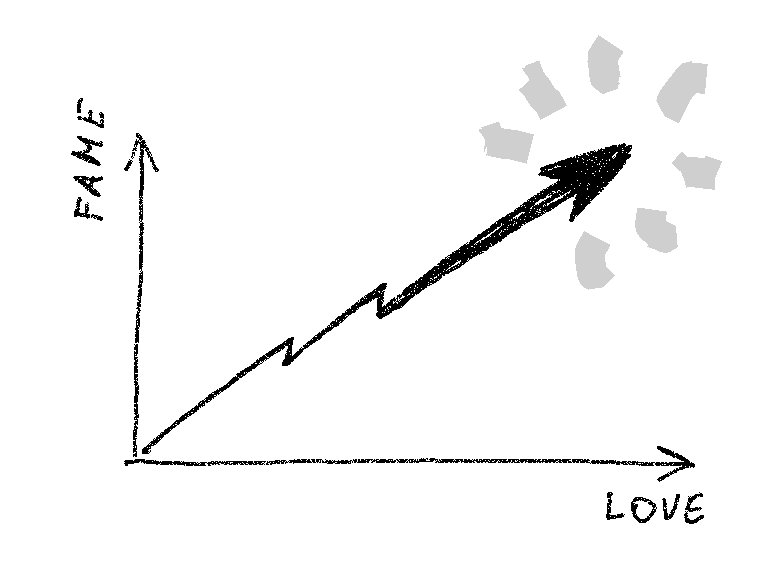
A pencil drawing of a chart with a line that keeps going up and up, and the chart has “fame” on the vertical axis and “love” on the horizontal one
Absolutely a myth. Everyone’s follows grow at their own rate, and there are so many different reasons for the different rates. Do you blog popular books or not? Do you blog YA? Do you review comic books? How often do you post and blog hop? How active are you on social media? Have you been an Instagram influencer before you started blogging?
And these aren’t even all the questions – things like where you’re from and whether your WordPress is free or self-hosted can also change things. Blogging is a lot like real life – some people get happily married because they were at the right place and the right time and met someone cool. Some people get awesome jobs because it just so happened. You might have those same character traits as them, but your life story might have just gone differently. Hard to compare, but I feel like ultimately that’s how blog follows work too.
We just can’t compare. We shouldn’t compare.
Book blogging myth #3.
Everyone else has more blog visits / post reads than me.
That’s probably not true. There’s a great confusion about “what stats I should have as a blogger”, and so many blog posts have already been done on this. Whenever there’s a poll, it reveals that the vast majority of bloggers think “normal” blog posts get way more views than they actually do. If anything, these polls only reveal our self-deprecating nature and how prone to that we are.
Most review posts get like 50-100 views for the vast majority of bloggers throughout the lifetime of that post. Don’t beat yourself up.
Book blogging myth #4.
I have to be on every kind of social media.
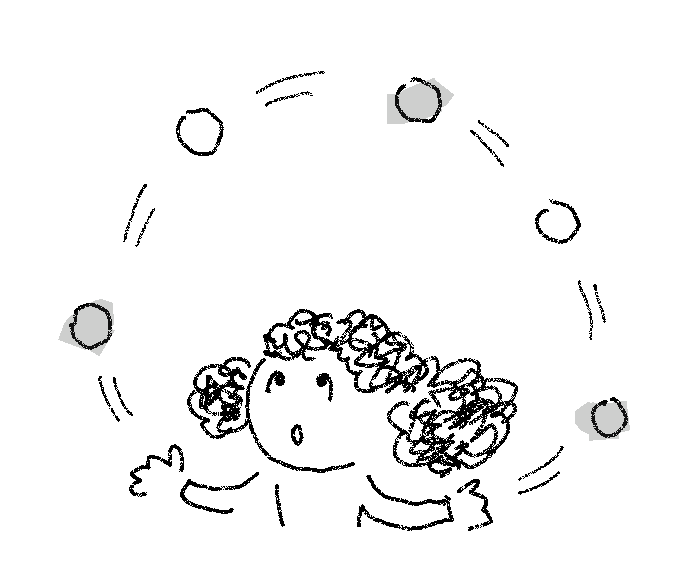
A pencil drawing of a curly girl (me), juggling five balls and looking alarmed (for the record, I can barely juggle two or three)
Not true. In fact, it’s better if you’re not. Cause unless you’re independently wealthy and do nothing else but blog, you just won’t be able to handle your daily life and all that social media at once. More than that, you won’t be able to put quality content on it. And people can easily see when you’re not present.
Then there’s another thing. If someone claims some said social media site is really working out for them, it doesn’t mean you must absolutely be on it too. For example: Pinterest seems to be the social media that works REALLY well for some bloggers, but the rest have tried it and scratch their head continously, trying various tutorials, to figure out what they did wrong (I will admit, I’m one of those – Pinterest is one social media I completely don’t understand.) What I think though, is that looking for your ‘mistakes’ on a certain social media is a waste of time. Want to know why? Because if you don’t use it for fun, you won’t be able to harness it. It’s like that for me with Pinterest – I don’t use it and I don’t enjoy it. I did try to make it work and I followed all the tutorials, but it just felt like a chore. So I dropped it.
I guess what makes you good at a certain social media site is that you enjoy the process. If it starts feeling like a chore, you’re probably better off not investing time in it.
There are plenty of real life chores out there – there’s no point of making your hobby into a chore too.
Looking for your 'mistakes' on certain social media sites is a waste of time. Want to know why? Because if you don't use it for fun, you won't be able to harness it. More #bookblogging myths here: Click To TweetBook blogging myth #5.
It’s going to be super easy to monetize my blog.
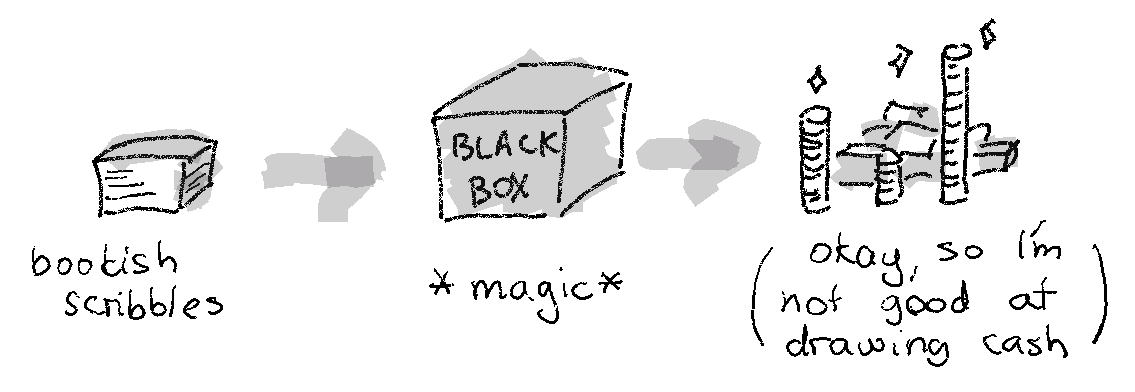
A pencil drawing of bookish scribbles being run through a magic black box and turning into stacks of money, which I admit I am not good at drawing so just take my word on it
See, there are definitely blogs out there that end up bringing the blogger some income. But you need to decide very early on whether you want this to be a job, or a hobby. And you need to make it one or the other.
The thing about book blogs is that the vast majority of them can’t get monetized at all. Another thing is that it’s a lot harder to monetize a book blog than, say, a lifestyle blog. Which is why I say that you need to decide early on. Book blogs tend to have much smaller audiences than beauty, lifestyle or travel blogs, so it prevents us from being able to monetize. If you want to still, maybe you could make your blog a lifestyle one, with a certain focus on books.
Another thing about monetizing is that when bloggers start out, they somehow don’t think that it will require work. Blogs are presented to look like fun, sitting around with coffee cups, cats and cake in front of bright windows, nice knit throws and great interior, and just enjoying life in general. But in reality, the only way you’ll end up being paid for product features is if you’re willing to sell out – because you can’t guarantee the product you’ll be reviewing will be that great. In this case, I’m not talking about book reviews. They’re almost never paid. If they are, you probably don’t want to read the books.
There are definitely blogs that end up bringing in some income. But you need to decide early on whether you want it to be a job or a hobby. And you need to make it one or the other. Click To TweetShort tangent though – I think Instagram is easier to monetize than blogs. l’ve heard of paid tours for bookstagram, but not for book blogs. This might be the case for booktube as well. Plus, Instagram is so much easier to branch out into seamless product features. So if you’re looking into monetization, that’s a direction you should look into.
Now, you say I haven’t even mentioned affiliate links or ad banners. HA HA HA! Because I’m not going to mention them. I have had affiliate links for two years and they have not brought in a single penny. Now you might say my blog is just shit – I’ll leave it up to you to decide. But hear me out why I say this.
Ad banners are something I have never had – because most bloggers I’ve talked to have said they barely even bring in cents, and l’ve never wanted to waste my time on dealing with the taxes for such paltry sums (that’s another thing you want to look into if you’re trying to monetize – your country will most likely tax you on it.) The best I’ve heard about monetizing is that it covers hosting fees for some bloggers. That’s like less than 10 bucks a month. I’ll leave it at that.
However, don’t think I’m telling you not to monetize. Just know what you’re up against and pick the right medium and strategy.
Blogs are presented to look like fun - sitting around with coffee cups, cats and cake in front of bright windows and just enjoying life. But is it really all that easy? Let's look at some #bookblogging myths: Click To TweetBook blogging myth #6.
I need to be this tall and this pretty to get review copies.
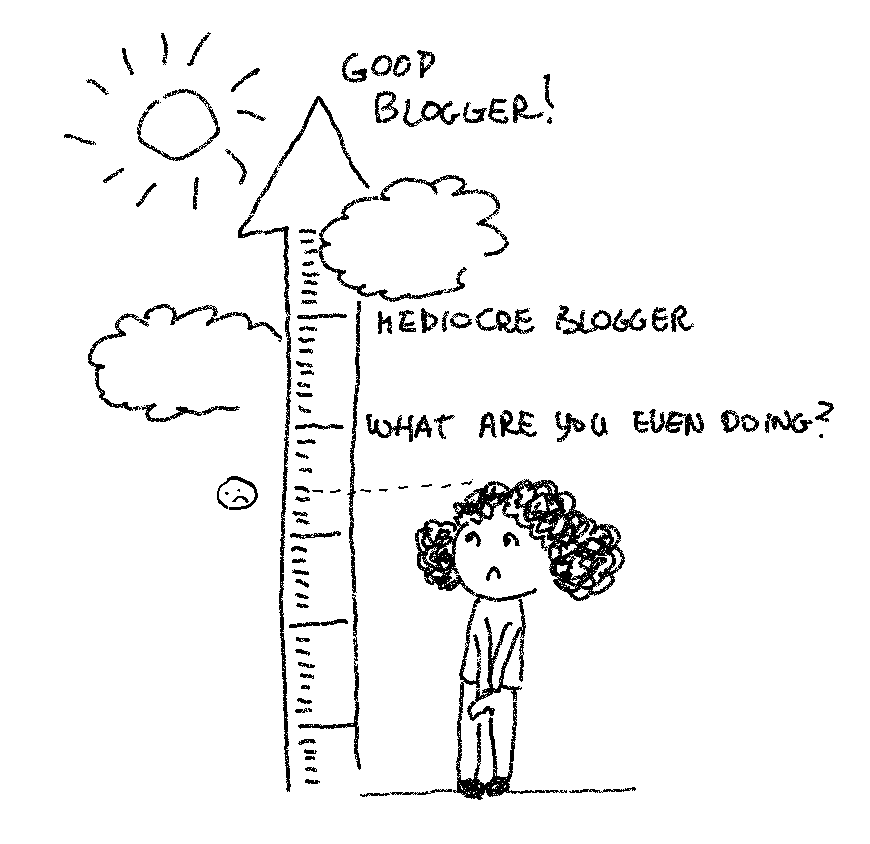
A drawing of a curly girl (me), looking distraught because she doesn’t measure up to a height measuring arrow that has “good blogger!” above the clouds, “mediocre blogger” slightly below them, and lastly “what are you even doing?”, my characters scores below that and there’s a sad face drawn next to it
Ah yes, the review copies. The blessing and the bane of a new blogger’s existence. The source of joy when you do get them, but regardless, a constant source of stress – whether you’re getting them or not.
The bloggers who don’t get them wonder when they’ll be “big enough” to get them. The ones that get them, request too much and can’t deal. Meanwhile, the internationals wonder if they even… count as bloggers.
Thing is, getting review copies is quite similar to getting followers – it’s individual! It depends on where you’re from. And also what books you request. And even aside from that, there are many other factors that I’ve already talked about in many posts (here, here and here). The main takeaways are:
- you are never “too small” or “too young as a blogger” to request. So just try!
- there’s also a certain etiquette to requesting and being approved, so read up on it
- it’s better to try than to wonder if you even qualify
- if you’re international, consider which region you’re requesting from (Europeans might have more luck with UK publishers, for example)
- if you’re international, you can still ABSOLUTELY get print review copies. Just not all of them and not from everywhere.
- you should really think before you request: are you requesting for the right reasons? Are you sure you can handle the time frame? Are you only requesting because of the hype, or do you genuinely want the book?
Regardless of whether you get review copies or not, you should never judge yourself based on that. Review copies are NOT something that determines the worth of a blogger. So also, like I said before – don’t beat yourself up.
Book blogging myth #7.
I must do this popular thing everyone’s doing.
Many bloggers believe that they must read hyped books, or at the very least, YA books to have a popular blog. While it is true that it will likely bring more traffic, if you’re forcing yourself to read something you only half care about, it won’t work. Lack of enjoyment will show, and even if people were to like it, will you? How long can you keep doing something you only half like ? Another important question would be… Why?
Do I really have to review popular books to be a popular #bookblogger? This and more #bookblogging myths: Click To TweetBook blogging myth #8.
I will be an authority and have an audience when I start blogging.
I don’t know if this is a thing for many others, but it was certainly a misconception I had when I started blogging, and I think it was mostly due to the fact that I work in marketing. I looked at blogging as a marketer, and in a way, that makes sense, but it really stops when you realize you’re not talking to a crowd – you’re talking to a community. Most of us don’t even know this exists before we start blogging. And yes, it’s true that some blogs are marketing blogs – but those are usually big and actually someone’s business. Blogging in a bookish community is so very different. But I believe, also so much more fun!
So now you’re wondering… Why blog at all?
Well… I feel bad about bursting a lot of these bubbles, because whatever we may say, we do care about the follows, popularity and the review copies. But now I’ve made it all sound so hard! Should you even keep blogging after this?
Yes. Yes, you should keep blogging!
Because the biggest reward that we are often not even aware of when we first start blogging is… The book blogging community. The community is about the most positive bunch of people there is! You tell them you’re disappointed and distraught about something, they’ll write you ton of warm and lovely messages and tweets. You say you don’t get review copies, they’ll set you up with contacts or send you books. And most importantly, they’ll fangirl / fanboy with you, they’ll just plain old talk to you about your personal life and they’ll become your best friends. I’m not even kidding!
That’s why I still blog, having burned myself out, gone through all of these myths being shattered before my very eyes and realizing I don’t have enough time for the blogging and real life. And yet I still keep going, because I just love being in this amazing community. It’s about the people!!! And… okay. It’s also somewhat about the books 😉
What people think #bookblogging is VS what book blogging can actually be - the greatest book blogging myths @avalinahsbooks has encountered: Click To TweetThere are way more book blogging myths out there. But these are the ones I can come up with now. Do you have others? If so, definitely share it with me in the comments!
I’m Evelina and I blog about books that made an impression on me. I love middle grade, women’s, scifi and some literary too.
